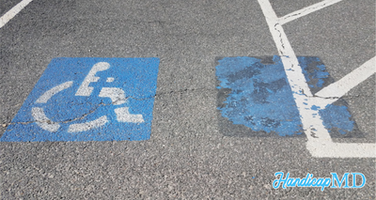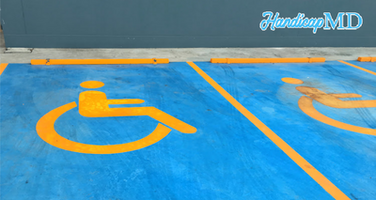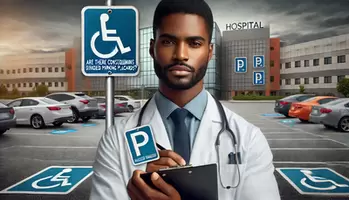
 Disabled Parking Permit in Long Beach: A Comprehensive Guide
Disabled Parking Permit in Long Beach: A Comprehensive Guide
Disabled Parking Permit in Long Beach - For individuals living in or visiting Long Beach, Ca, and requiring accessible parking, having a disability tag can provide much-needed convenience and ease of mobility. Understanding the process for obtaining a permit, the rules, and the benefits of using a service like HandicapMD.com is essential. This article breaks down everything you need to know about getting a disabled parking permit in Long Beach, including how to qualify, the types of permits available, the associated fees, and other key details.
If you're looking for reliable, comprehensive information on how to get a Disabled Parking permit in Long Beach, you've come to the right place. Let's dive into the details, so you can navigate the process effortlessly.
Qualifying Medical Condition for a Disability Tag in Long Beach
To qualify for a disabled parking placard or license plate in Long Beach, applicants must have a condition that significantly impairs their ability to move about or perform normal physical functions. The California Department of Motor Vehicles (DMV) outlines specific medical conditions that warrant the issuance of a disability tag. Below, we detail each condition, explaining why it qualifies and how it impacts mobility. For more information on eligibility requirements, you can also consult the California DMV's Disabled Parking page.
1. Loss or Limited Use of One or Both Lower Extremities
Individuals who have lost the use of one or both legs, or who suffer from conditions that limit their use, often find it extremely challenging to walk or stand for extended periods. This can include those with prosthetic limbs or individuals who use wheelchairs, crutches, or other mobility aids. The inability to walk without significant assistance creates a need for accessible parking close to building entrances. According to the Mayo Clinic, individuals with amputations or severe mobility issues require special accommodations, including accessible parking.
2. Conditions that Impair or Limit the Ability to Walk (e.g., Severe Arthritis)
Conditions like severe arthritis can cause chronic pain, swelling, and stiffness in the joints, particularly in the hips, knees, and feet, which limits mobility. According to the Arthritis Foundation, severe cases of arthritis can make it difficult to walk even short distances, and some individuals may require the use of mobility aids. These individuals benefit greatly from parking spaces that reduce the need for long walks and provide a level surface for ease of movement.
3. Respiratory or Cardiac Conditions that Make Mobility Difficult
Respiratory diseases such as chronic obstructive pulmonary disease (COPD), emphysema, and asthma can cause shortness of breath and fatigue after minimal physical exertion. Similarly, heart conditions such as congestive heart failure or arrhythmias can limit endurance, making it difficult to walk long distances or climb stairs. According to the American Lung Association and American Heart Association, these conditions create a need for accessible parking spaces close to building entrances to reduce the distance a person needs to travel on foot, preventing fatigue or shortness of breath.
4. Vision Impairments or Blindness
Individuals with severe vision impairments or blindness may struggle with navigating standard parking lots, which are often full of obstacles and moving vehicles. A disability placard allows them to park in designated spots that offer safer and closer access to building entrances, reducing the risk of injury or disorientation. According to the American Foundation for the Blind, accessible parking helps visually impaired individuals maintain a greater degree of independence and safety.
5. Loss of Motor Function Due to Paralysis or Neurological Disorders
Paralysis or neurological conditions, such as multiple sclerosis (MS), muscular dystrophy, or Parkinson’s disease, can severely limit motor function, making walking or standing for extended periods difficult or impossible. These individuals may also require the use of wheelchairs or mobility devices. According to the National Multiple Sclerosis Society, these progressive conditions impair motor control, balance, and coordination, necessitating parking spots with close access to buildings and ramps to accommodate mobility devices.
6. Other Qualifying Conditions
In addition to the conditions listed above, there are several other medical conditions that may qualify someone for a disabled parking permit, such as:
- Severe circulatory issues
- Inflammatory conditions that affect mobility (e.g., lupus)
- Orthopedic conditions requiring the use of braces or supports
These conditions significantly limit an individual’s ability to walk or function without pain or discomfort, thus qualifying them for a disabled parking permit.
Certification and Application
To apply for a disabled parking placard, applicants must have their condition certified by a licensed medical professional. Doctors, nurse practitioners, and physician assistants can all provide the necessary medical certification. If you believe your medical condition qualifies you for a disabled parking permit, consult your healthcare provider, who will complete the required forms for the California DMV.
If you believe your condition qualifies, consult with your healthcare provider to begin the process. For more details, visit the official DMV disabled parking information page.
How to Obtain a Permit Online with HandicapMD.com
Getting a disability parking permit online has never been easier, thanks to services like HandicapMD.com. If you’re unfamiliar with the process or simply want to avoid long waits and paperwork, HandicapMD.com simplifies it by offering telemedicine consultations with licensed physicians who can verify your eligibility. Here’s how the process works:
- Sign up on the HandicapMD.com platform: Complete an online application form and provide basic information about your condition.
- Consult with a licensed doctor: This consultation can happen via video call, during which the doctor will review your medical history and determine whether you qualify for the parking placard.
- Receive your DMV forms: Once approved, HandicapMD.com will send the completed DMV forms to you.
- Submit your application: You can submit your completed application directly to the DMV by mail or in person. For Long Beach residents, this eliminates the need to visit the DMV.
For a more detailed explanation of the process, check out HandicapMD.com’s application page.
Why Is Getting the Tag Online Beneficial?
Choosing to apply for a disability tag online offers several advantages, especially through a service like HandicapMD.com:
- Convenience: You can complete the entire process from the comfort of your home, avoiding long DMV lines and travel hassles.
- Expert guidance: Licensed physicians experienced with disability evaluations ensure your application meets the requirements.
- Fast turnaround: Since everything is done online, the process moves quickly, and you receive your documents faster.
If you're ready to apply, visit HandicapMD.com to get started.
What Types of Handicap Parking Permits Are Available in Long Beach, CA?
Long Beach offers several types of parking permits to accommodate different needs. These include:
- Temporary placards: Valid for up to six months, these are ideal for short-term mobility impairments or recovery periods.
- Permanent placards: Valid for two years, these are for individuals with long-term disabilities.
- Disabled license plates: For vehicle owners who require accessible parking permanently.
- Travel placards: For those visiting a who already have a disability placard from another state.
It’s important to apply for the correct type of permit based on your medical needs. You can learn more about the different types of permits available on the California handicap parking placards online page.
Long Beach Handicap Parking Permit Rules
Fee
For permanent and temporary disability placards, the DMV does not charge a fee. However, disabled license plates may require a small fee, depending on the type of vehicle and specific needs. Be sure to check with the DMV for any potential costs associated with your application.
Validity/Expiration of Permits
Temporary placards are valid for up to six months, while permanent placards are valid for two years. Both types of placards must be renewed before they expire. HandicapMD.com can assist with renewals, and you'll receive reminders to ensure that your placard remains valid.
Renewals
The DMV automatically renews permanent disability placards every two years, sending a new placard by mail. Temporary placards, however, require reapplication. Be sure to apply for renewal at least a month before your permit expires to avoid any gaps in coverage.
To renew your permit, you can submit a renewal application through the DMV.
Lost, Stolen, or Damaged Placards
If your placard is lost, stolen, or damaged, you must complete a replacement form, available on the DMV website. There is no fee for replacing a permanent placard, but you may need to provide documentation proving your eligibility.
Is Disabled Parking Free in Long Beach?
Yes, in most areas, parking is free for vehicles displaying a disability placard or plate. This includes metered parking spaces. However, always check local signs and regulations as some areas may have time restrictions or specific rules for accessible spots.
Where to Hang the Placard
Your placard should be hung from your rearview mirror whenever you're parked in a designated accessible parking space. Be sure to remove it when driving, as it can obstruct your view.
Who Can Verify an Application for a Disabled Permit in Long Beach?
A licensed physician, nurse practitioner, or physician assistant can verify and sign your application for a disabled parking permit. For convenience, HandicapMD.com provides telemedicine consultations with qualified doctors who can certify your medical condition and complete your DMV forms.
Do You Have to Pay for Handicap Parking in Long Beach?
Generally, no. Vehicles with a valid disability tag are allowed to park for free in metered spaces. However, it’s important to check the signs for time limits, as parking enforcement may still issue a ticket for exceeding time limits.
Can I Use My Handicap Placard in Someone Else's Car in Long Beach?
Yes, as long as you, the placard holder, are in the car, you can use the placard in any vehicle. The placard is tied to the individual, not the car, so you can use it while traveling with friends or family.
Can a Pregnant Woman Get a Handicap Placard in Long Beach?
In some cases, pregnant women experiencing significant mobility issues or medical complications, such as symphysis pubis dysfunction (SPD), may qualify for a temporary disability placard. The medical provider will need to assess the condition and determine if it warrants a parking permit. For more details on getting a disability permit for pregnancy, visit HandicapMD.com’s pregnancy guide.
Where Do I Get a Handicap Placard Near Me?
Long Beach residents can obtain a handicap placard through the DMV, either in person or by mail. Alternatively, you can apply online using HandicapMD.com for a smoother, quicker process. To locate the nearest DMV office, visit the DMV locations page.
Where Is a Long Beach Handicap Parking Permit Valid?
A disabled parking permit issued in Long Beach is valid throughout the state, including all public and private parking lots that designate accessible spots. Additionally, Long Beach permits are recognized in many other states, making it easier to travel without needing a separate permit.
Request a Disabled Parking Zone in Long Beach
Residents of Long Beach who have been issued a special identification license plate under Vehicle Code section 5007, or a distinguishing placard under Vehicle Code sections 22511.55 or 22511.59, can apply for the designation of an on-street parking space as a reserved disabled parking zone. This allows eligible individuals to secure accessible parking near their homes.
Disabled Parking Zone Application Process
According to Section 10.34.025 of the Long Beach Municipal Code, applicants must certify that no existing on-street or off-street parking near their residence adequately meets their needs. Section 4 of the application offers space to provide a detailed explanation of why the current parking options are insufficient for you.
It's important to note that applications lacking a reasonable explanation or certification may be denied. Additionally, while a disabled parking zone may be installed near your home upon approval, these zones are not exclusively reserved for the applicant. Any motorist displaying a valid disabled parking placard or disabled license plate may use any disabled parking space on public property.
For more information on the relevant Vehicle Code sections, you can refer to Vehicle Code Section 5007 and Vehicle Code Section 22511.55.
Submitting Your Application
To submit your completed Disabled Parking Zone application, you can send it via mail, fax, or hand-delivery to the City of Long Beach. The city strives to install these zones in a timely manner, though installation may occasionally be delayed due to other priorities.
- Mail or hand delivery: Please deliver your completed application to the appropriate Long Beach city office.
- Fax: You may fax the application to (562) 570-7161.
For updates on the status of your application or to check on delays, you can call the city's office directly at (562) 570-6331.
You can access more information about Long Beach parking regulations and apply for a disabled parking zone through the official City of Long Beach Parking Division.
Obtain Your Permit with HandicapMD.com
Getting a disability parking permit doesn't need to be complicated. With HandicapMD.com, you can streamline the process, avoid lengthy DMV visits, and obtain a permit from the comfort of your home. The expert team at HandicapMD.com will guide you every step of the way, ensuring you receive the right permit for your needs.
If you're ready to start, visit HandicapMD.com today for a seamless, stress-free experience.
Obtaining a disability tag in Long Beach has never been easier—apply online with HandicapMD.com today and simplify the process.
.png)





